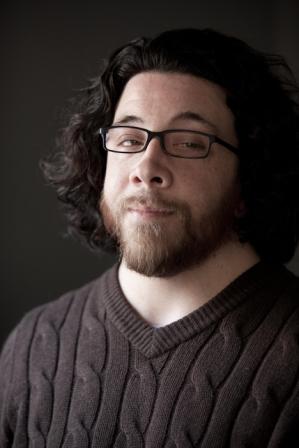
Saladin Ahmed, the author of Throne of the Crescent Moon, recently visited Dragonmount for a Q&A session. The following is a compilation of all the questions and answers from his visit. This session was hosted by Mashiara Sedai of the Dragonmount Artists, Crafters, and Writers Guild.
Host: Dragonmount is pleased to welcome Saladin Ahmed for a week long author Q&A session. Mr. Ahmed's short fiction has been nominated for the Nebula and Campbell awards, and his debut fantasy novel, Throne of the Crescent Moon, has received rave reviews from outlets ranging from Kirkus to NPR to io9. Mr. Ahmed has also been a guest on Brandon Sanderson's "Writing Excuses" podcast.
And now, he's here to answer your questions! Please post your questions below, and remember to be respectful and follow Dragonmount's Code of Conduct. Help me give Mr. Ahmed a warm welcome!
Mr. Ahmed, thank you for joining us for this event!
QUICK EDIT:
Mr. Ahmed might not be able to start answering questions until Tuesday (the 24th), but please feel free to post your questions now. He will answer all of them!
Ahmed: Hi there, folks! I'm THRILLED to be a guest here at Dragonmount. The early Wheel of Time books (embarrassingly, I'm WAY behind on the series) are some of my all-time favorite fantasy novels, and they've been a profound influence on my own work. (To give an example, Aviendha was one of the inspirations for Zamia Banu Laith Badawi, one of the main characters in my first novel.) So to be given a chance to talk a bit about my writing to this community means a lot to me.
As Mashiara Sedai indicated, I'm on the road right now, so I may be a bit slow with responses. Also, please bear with me as I figure out how the forum works, as I'm a bit of a techno-klutz. (I hope my Thom avatar shows up properly!)
With all of that out of the way, here we go!
Q: I'll start off with the first question. In Throne of the Crescent Moon, how much of the story, characters, myth, and magic are based on actual Middle Eastern culture and traditions? How much is pure imagination? How did you find a balance between the two?
A: Balancing real-world historical and cultural influences with Just Plain Made Up Stuff was one of the big challenges I faced in writing Throne of the Crescent Moon. For example, while the main in-world religion of Throne is very clearly influenced by medieval Islam, there are massive departures as well. Same with the monsters, which are lifted as much from Ray Harryhausen movies as they are from the actual mythology of the Islamic world. Ultimately, this is the reason I wrote a secondary-world fantasy instead of a historical one. You just plain have more freedom in writing the former. So what ended up on the pages of Throne is basically 1/3 genuine Islamic history/culture, 1/3 conventions and tropes from western fantasy novels (incl. WoT!), and 1/3 stuff from my own imagination. It's a Frankenstein's monster of a novel in some ways, but hopefully the stitches don't show.
Q: How difficult is it to juggle professional writing and your personal life? How much writing do you accomplish each day? Do you have a strict word count you have to keep to?
A: As to your second question...I won't jinx myself by talking about word count per se, but I will say that the personal/professional balance is hard, hard, hard. Did I mention it's hard? I'm a father to twin two-year-olds, which makes the already EXTREMELY difficult life of a non-bestselling author that much tougher. Full disclosure: I had a public semibreakdown on the internet a month or so back. One of the most remarkable things that emerged from that post was the flood of email I received from other writers--ranging from unpublished folks to NY Times Bestselling authors--who basically said "I don't admit it in public, but I'm going through/have gone through something very similar." Going kind of crazy trying to strike a balance seems almost to be a sort of occupational hazard. But I keep at it in part because of the inspiration provided by writers like Robert Jordan. The chance to bring the sort of pleasure to other readers that he brought to me...that's a powerful, powerful motivator.
Q: Do you have any tips for kick-starting inspiration? For example, is there a movie you watch, a book you read, or a song you listen to in order to get in a creative mood?
A: I almost never write to music because I find it distracting. One of the things I've had to reconcile myself to as I've gone pro is that I no longer have the luxury to wait on the muses, or even to coax them out of hiding. Once you sell a trilogy, you're on a deadline and need to produce words come hell or high water. So mostly it's all about massive amounts of coffee for me.
Thanks for the questions, guys! Looking forward to more!
Q: How valuable do you find meeting fans in person at either signings or conventions? Is it necessary for a new author to hit the road and meet potential fans, or does the work speak for itself?
A: Meeting fans at cons is extremely gratifying, and the networking with other professionals at cons can be great. More than that, the camaraderie and just-plain-fun is something I'd be miserable without.
But.
Cons cost time and money. I'd never describe them as *necessary*--more like a wonderful indulgence that can *sometimes* yield professional benefits. The best way to approach them is as a sort of working vacation with fellow nerds.
Q: Okay, I have a bit of a complex question...In your writing, how do you get from point A to point B (let's say point A is the beginning and point B is the end)? For example, I have a work, I know how I want it to begin and I know how I want it to end, but everything in between is blank space. How do you fill the blank spaces in your work? Do you have any tricks that help you in this area?
A: Actually *writing* chunks of the last chapter--before the middle of the book has been written--helps me to build a "bridge" between it and the first few chapters. I'm forced to think in detail about everything that needs to be mentioned in a final chapter. Which plot questions are answered, which characters are still there, *where* the last scene takes place, and how the characters got there, etc. By the time I've figured out what exactly I'm going to say in the last chapter, I've done a great deal of thinking about the couple of hundred pages preceding it.
Q: I don't want to give away any spoilers, but I LOVED the Falcon Prince as a character. Is he going to be prominent in the next book?
A: I'm glad you liked him! Yes, the Falcon Prince will be a VERY major character in Book II. The events at the end of Throne will have huge repercussions across the Crescent Moon Kingdoms (and beyond), and Pharaad Az Hammaz will be at the center of the maelstrom.
Q: Hi, Mr. Ahmed! I LOVED the novel! Can't wait to read your next one!
I think the thing that struck me most, trying not to do too many spoilers, was how true to themselves Zamia and Raseed stayed. Was it hard to leave loose ends and kind of forgo the more typical ending?
I also really liked that we joined the story near the end of Adoulla's career. Do you think we will ever see any prequels that tell more of his beginnings?
A: Thanks for reading! Trying to avoid spoilers here, but as far as Z & R go, I'll just say that the nice thing about writing the first book in a series is that it leaves a fair amount of room for loose ends. Zamia and Raseed each have some pretty intense challenges facing them in Book II. I'll give this much away: Zamia will learn more than she ever wanted to know about the djenn (who are mentioned but not seen in Book I), and Raseed will cross swords with a rogue dervish of the Order.
As to your second point: The Crescent Moon Kingdoms was conceived (and sold) as a trilogy. But if I do ever write a fourth book, there's a pretty good chance it would be a prequel.
Q: Do you ever find yourself in a place where you personally want things to go one way but know that the reader would want something else? If so, what do you do in such situations?
A: That's a really interesting question. I think while I'm writing I want things to go pleasantly for my characters, and I want my characters to be completely likable. But as a reader I love biting my nails or getting choked up over a character's tribulations, and I love characters' imperfections. So I try to give those things to my readers.
Q: How do you go about setting up a scene in your head and then transferring it to written word? The same goes for people. I can see the images in my head but I can never find the right words to describe them. Do you ever have these issues?
Have you ever initially created a character that you intended to kill very early on (like chapter 1) and turn around and keep them as a supporting character?
A: Perhaps because I spent many years writing and publishing poetry, I don't tend to have trouble finding the right *words*--cooking up plots is more where I have to work my hardest. Writer's block is less of a problem for me than finding *time* and *energy* to write.
As to question 2: I almost experience the opposite as far as killing characters goes--I *like* my characters, and if left to my own devices I'd probably not do them harm. But sometimes the story calls for what the story calls for, and I have to push myself into it.
Q: Have you ever experienced that a character "takes control" and starts doing things that you hadn't intended him/her to do?
A: Heh. Hearing writers talk about that--and I have many dear friends who experience "characters taking control"--always makes me angry and jealous. Why? Because *I've* never experienced it, and I wish I could, because it seems like it could be very helpful.
Q: Honored to meet you.
What drew you to writing?
A: My father, who--against certain socioeconomic odds--surrounded me with fun books, and encouraged my literary creativity from a young age.
Q: Okay, next question: did you study writing academically, or just start pursuing it as a hobby at first?
A: I've always been an "amateur" writer of some sort, since I was a kid. I did do formal training in creative writing--I have an MFA in Poetry--but being a member of various SF/F workshops & writers' groups has been more directly relevant to my current work.
Q: Have you ever had a thought or a dream that you just had to write down right that minute no matter what?
A: Yes, lots! Don't get to do it as often now that I have kids, though--I need to guard sleep-time more jealously, since it's so rare...
Q: Hey Saladin, I was curious, is there anything that you see writers doing that annoys the hell out of you? For instance Stephen King's comments about overuse of "he said blandly," "she said hotly."
What are the things you think new writers need to avoid?
A: Honestly, I think most "rules" (DON'T USE ADVERBS! DON'T BREAK POV! MAKE YOUR CHARACTER WANT SOMETHING!) are useless in the abstract. Any given work can violate them if it does so well.
Q: What do you look for in a good story?
A: A good story for me TENDS to offer some triangulation of entertainment value, writing skill, and ethos. Have something to say, say it well, and make it enjoyable (or rewarding) to read. YMMV, of course.
Q: Who is your favorite Wheel of Time character and why? Which scene in the series is your favorite?
After you finish the Crescent Moon Kingdoms series, do you have plans for another story/series already in mind?
A: That's tough. Of the "big three" guys, it's probably Perrin. But some of my very favorites are second-string characters. Thom Merrillin, Bayle Domon, Aviendha, Rhuarc, Min. And of course Lan. Lan is like the Wolverine of WoT--who *doesn't* like him?
I think almost all of The Eye of the World and The Great Hunt is just jaw-dropping stuff, honestly. But as far as a single scene, it's hard to top the Die Hard-type ending of Dragon Reborn. I mean, to have transplanted the style of the action thriller into an epic fantasy novel so powerfully--I don't think anyone did it before RJ did, and I don't think anyone's done it better since.
Finally, yes, I have several back-burner projects, some of which may end up getting written simultaneously as the Crescent Moon Kingdoms books.
Q: Do you ever include scenes with references or jokes purely for your own enjoyment? As in that the readers might not get the joke or understand the reference.
A: Yes, I do that a fair amount. But usually by the time I've revised and edited they become unrecognizable as in-jokes.
Q: What books would you for recommend someone to read?
A: That's pretty broad, so here are two random favorite writers I think people should read: Naguib Mahfouz and Fritz Leiber.
THANKS A TON FOR HAVING ME HERE, ALL!
Host: Thank you, Mr. Ahmed, for joining us. We really appreciate you making yourself available for your fans. And as Ireond said, please come back again!












Recommended Comments
There are no comments to display.
Join the conversation
You can post now and register later. If you have an account, sign in now to post with your account.
Note: Your post will require moderator approval before it will be visible.